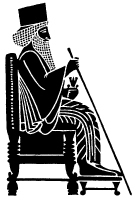MARK GRIFFITH is professor of classics and of theater, dance, and performance studies at the University of California, Berkeley.
GLENN W. MOST is professor of ancient Greek at the Scuola Normale Superiore at Pisa and a visiting member of the Committee on Social Thought at the University of Chicago.
DAVID GRENE (19132002) taught classics for many years at the University of Chicago.
RICHMOND LATTIMORE (19061984), professor of Greek at Bryn Mawr College, was a poet and translator best known for his translations of the Greek classics, especially his versions of the Iliad and the Odyssey .
The University of Chicago Press, Chicago 60637
The University of Chicago Press, Ltd., London
2013 by The University of Chicago
Agamemnon 1947 by Richmond Lattimore,
1953, 2013 by the University of Chicago
The Libation Bearers, The Eumenides 1953, 2013
by the University of Chicago
Proteus 2013 by the University of Chicago
All rights reserved. Published 2013.
Printed in the United States of America
22 21 20 19 18 17 16 15 14 13 1 2 3 4 5
ISBN -13: 978-0-226-31146-3 (cloth)
ISBN -13: 978-0-226-31147-0 (paper)
ISBN -13: 978-0-226-31148-7 (e-book)
ISBN -10: 0-226-31146-5 (cloth)
ISBN -10: 0-226-31147-3 (paper)
ISBN -10: 0-226-31148-1 (e-book)
Cataloging-in-Publication Data is available from the Library of Congress.

This paper meets the requirements of ANSI/NISO Z 39.481992 (Permanence of Paper).
THE COMPLETE GREEK TRAGEDIES
Edited by David Grene & Richmond Lattimore
THIRD EDITION Edited by Mark Griffith & Glenn W. Most
AESCHYLUS II
THE ORESTEIA Translated by Richmond Lattimore
AGAMEMNON
THE LIBATION BEARERS
THE EUMENIDES
PROTEUS (FRAGMENTS) Translated by Mark Griffith
The University of Chicago Press CHICAGO & LONDON
CONTENTS
The first edition of the Complete Greek Tragedies , edited by David Grene and Richmond Lattimore, was published by the University of Chicago Press starting in 1953. But the origins of the series go back even further. David Grene had already published his translation of three of the tragedies with the same press in 1942, and some of the other translations that eventually formed part of the Chicago series had appeared even earlier. A second edition of the series, with new translations of several plays and other changes, was published in 1991. For well over six decades, these translations have proved to be extraordinarily popular and resilient, thanks to their combination of accuracy, poetic immediacy, and clarity of presentation. They have guided hundreds of thousands of teachers, students, and other readers toward a reliable understanding of the surviving masterpieces of the three great Athenian tragedians: Aeschylus, Sophocles, and Euripides.
But the world changes, perhaps never more rapidly than in the past half century, and whatever outlasts the day of its appearance must eventually come to terms with circumstances very different from those that prevailed at its inception. During this same period, scholarly understanding of Greek tragedy has undergone significant development, and there have been marked changes not only in the readers to whom this series is addressed, but also in the ways in which these texts are taught and studied in universities. These changes have prompted the University of Chicago Press to perform another, more systematic revision of the translations, and we are honored to have been entrusted with this delicate and important task.
Our aim in this third edition has been to preserve and strengthen as far as possible all those features that have made the Chicago translations successful for such a long time, while at the same time revising the texts carefully and tactfully to bring them up to date and equipping them with various kinds of subsidiary help, so they may continue to serve new generations of readers.
Our revisions have addressed the following issues:
Wherever possible, we have kept the existing translations. But we have revised them where we found this to be necessary in order to bring them closer to the ancient Greek of the original texts or to replace an English idiom that has by now become antiquated or obscure. At the same time we have done our utmost to respect the original translators individual style and meter.
In a few cases, we have decided to substitute entirely new translations for the ones that were published in earlier editions of the series. Euripides Medea has been newly translated by Oliver Taplin, The Children of Heracles by Mark Griffith, Andromache by Deborah Roberts, and Iphigenia among the Taurians by Anne Carson. We have also, in the case of Aeschylus, added translations and brief discussions of the fragments of lost plays that originally belonged to connected tetralogies along with the surviving tragedies, since awareness of these other lost plays is often crucial to the interpretation of the surviving ones. And in the case of Sophocles, we have included a translation of the substantial fragmentary remains of one of his satyr-dramas, The Trackers ( Ichneutai ). (See How the Plays Were Originally Staged below for explanation of tetralogy, satyr-drama, and other terms.)
We have altered the distribution of the plays among the various volumes in order to reflect the chronological order in which they were written, when this is known or can be estimated with some probability. Thus the Oresteia appears now as volume 2 of Aeschylus tragedies, and the sequence of Euripides plays has been rearranged.
We have rewritten the stage directions to make them more consistent throughout, keeping in mind current scholarly understanding of how Greek tragedies were staged in the fifth century BCE . In general, we have refrained from extensive stage directions of an interpretive kind, since these are necessarily speculative and modern scholars often disagree greatly about them. The Greek manuscripts themselves contain no stage directions at all.
We have indicated certain fundamental differences in the meters and modes of delivery of all the verse of these plays. Spoken language (a kind of heightened ordinary speech, usually in the iambic trimeter rhythm) in which the characters of tragedy regularly engage in dialogue and monologue is printed in ordinary Roman font; the sung verse of choral and individual lyric odes (using a large variety of different meters), and the chanted verse recited by the chorus or individual characters (always using the anapestic meter), are rendered in italics , with parentheses added where necessary to indicate whether the passage is sung or chanted. In this way, readers will be able to tell at a glance how the playwright intended a given passage to be delivered in the theater, and how these shifting dynamics of poetic register contribute to the overall dramatic effect.
All the Greek tragedies that survive alternate scenes of action or dialogue, in which individual actors speak all the lines, with formal songs performed by the chorus. Occasionally individual characters sing formal songs too, or they and the chorus may alternate lyrics and spoken verse within the same scene. Most of the formal songs are structured as a series of pairs of stanzas of which the metrical form of the first one (strophe) is repeated exactly by a second one (antistrophe). Thus the metrical structure will be, e.g., strophe A, antistrophe A, strophe B, antistrophe B, with each pair of stanzas consisting of a different sequence of rhythms. Occasionally a short stanza in a different metrical form (mesode) is inserted in the middle between one strophe and the corresponding antistrophe, and sometimes the end of the whole series is marked with a single stanza in a different metrical form (epode)thus, e.g., strophe A, mesode, antistrophe A; or strophe A, antistrophe A, strophe B, antistrophe B, epode. We have indicated these metrical structures by inserting the terms STROPHE, ANTISTROPHE, MESODE, and EPODE above the first line of the relevant stanzas so that readers can easily recognize the compositional structure of these songs.

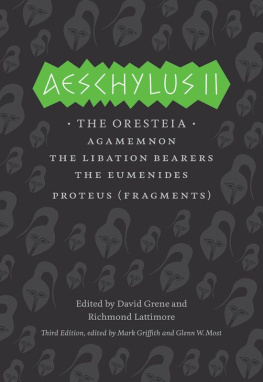
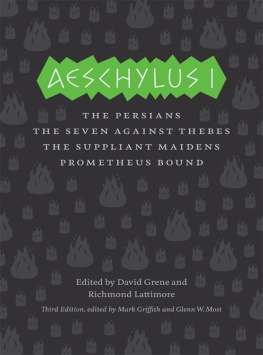
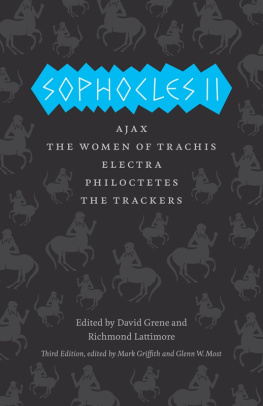
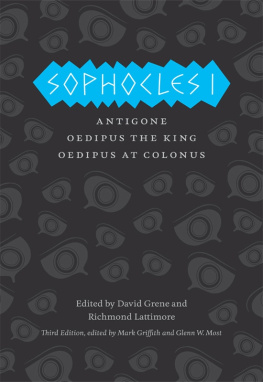
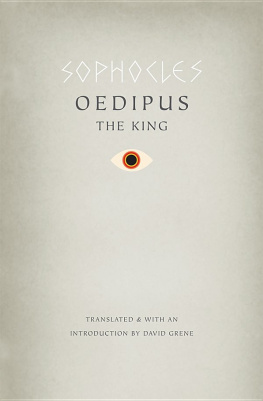
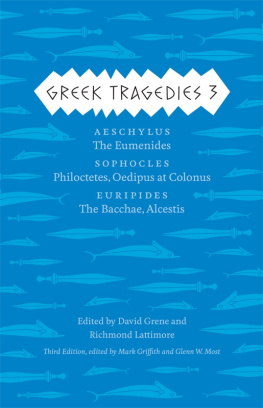
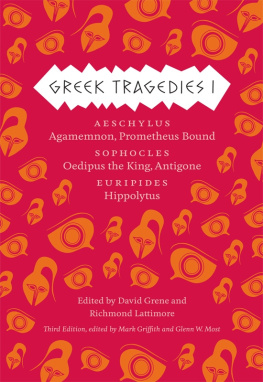
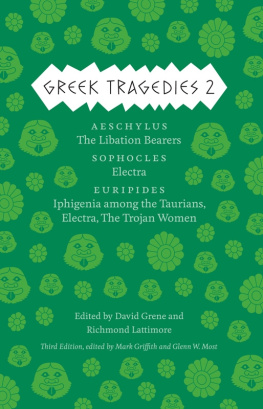
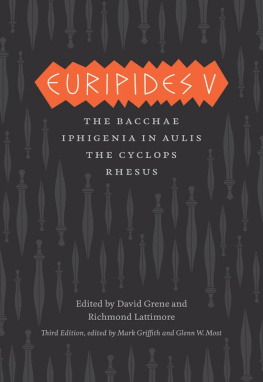
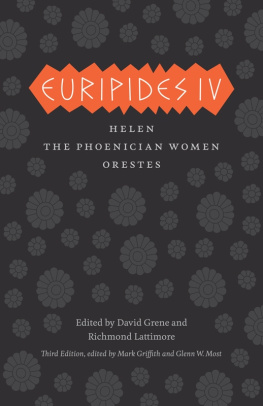
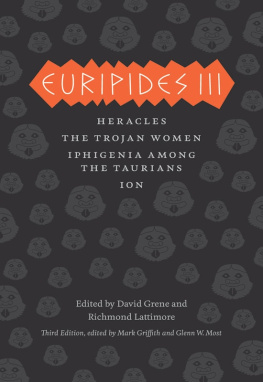
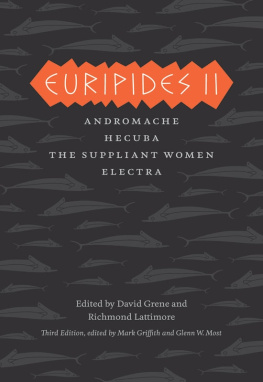
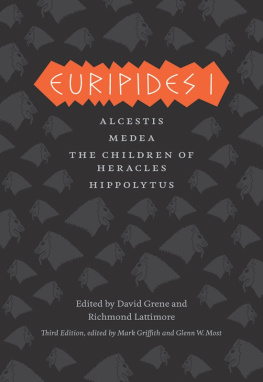
 This paper meets the requirements of ANSI/NISO Z 39.481992 (Permanence of Paper).
This paper meets the requirements of ANSI/NISO Z 39.481992 (Permanence of Paper).